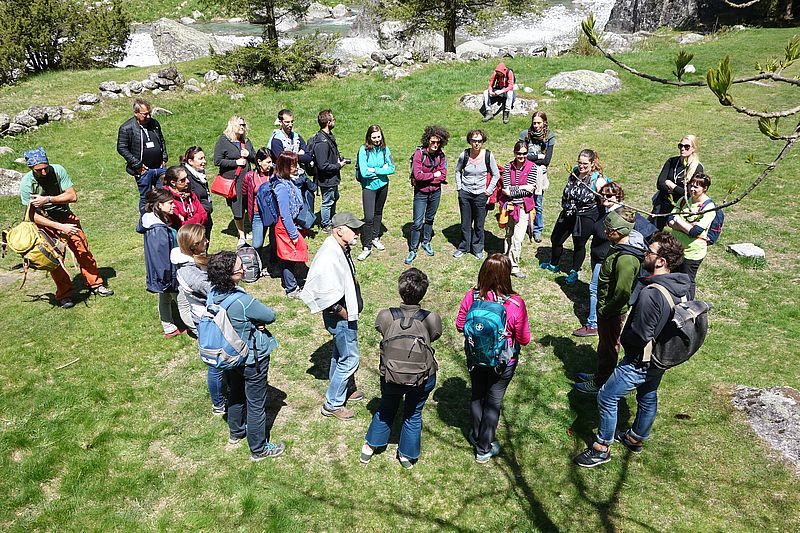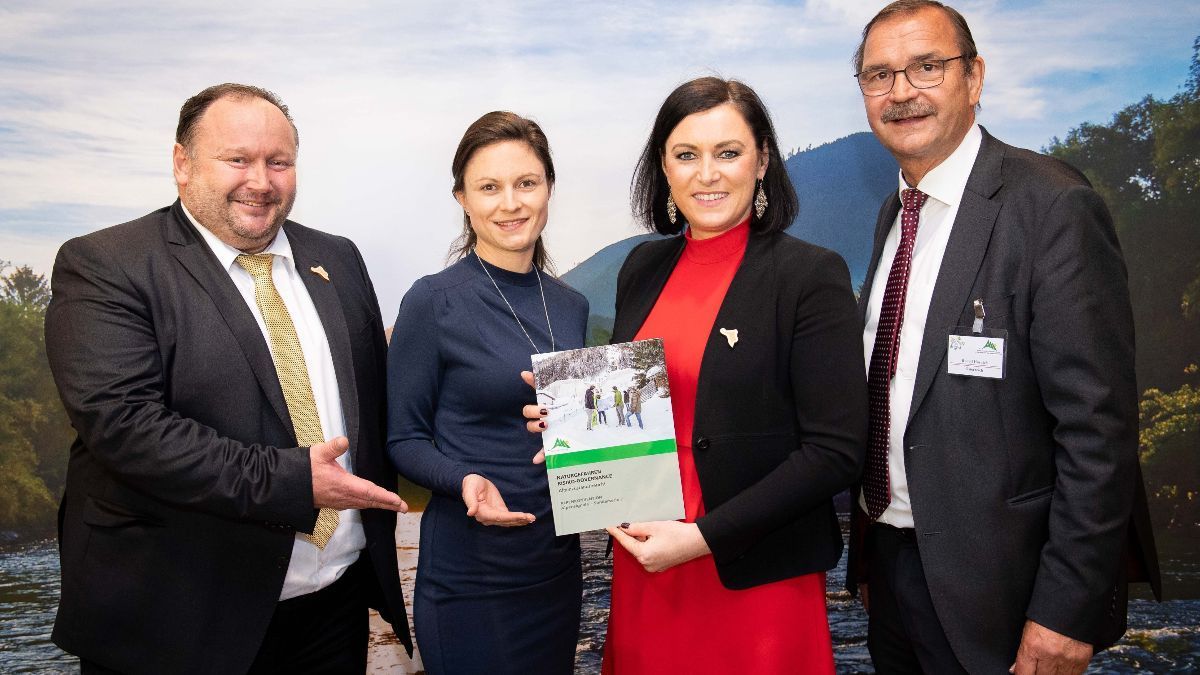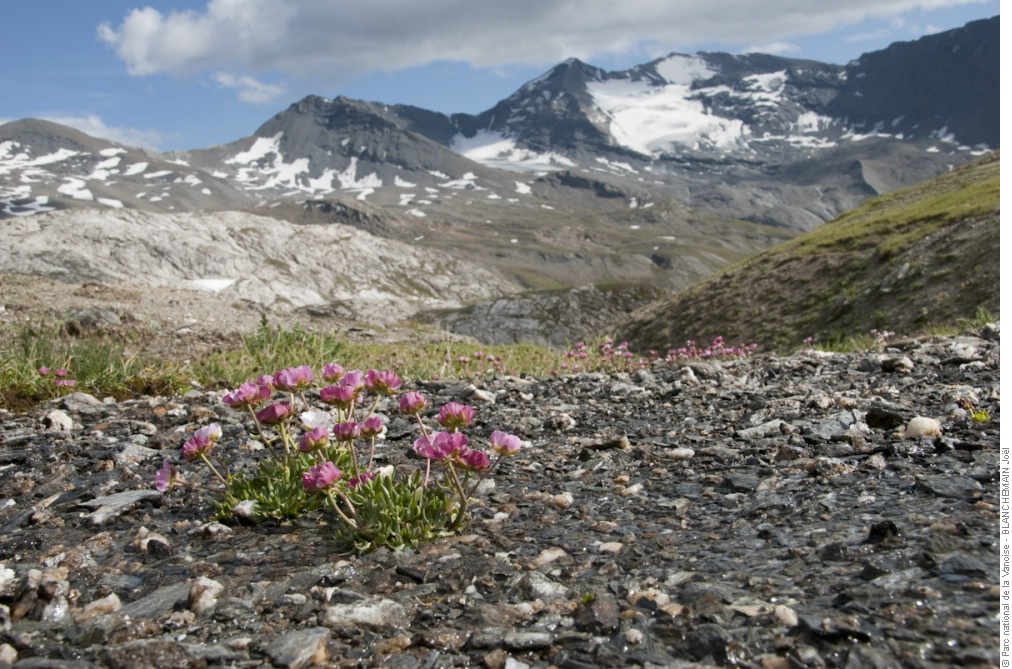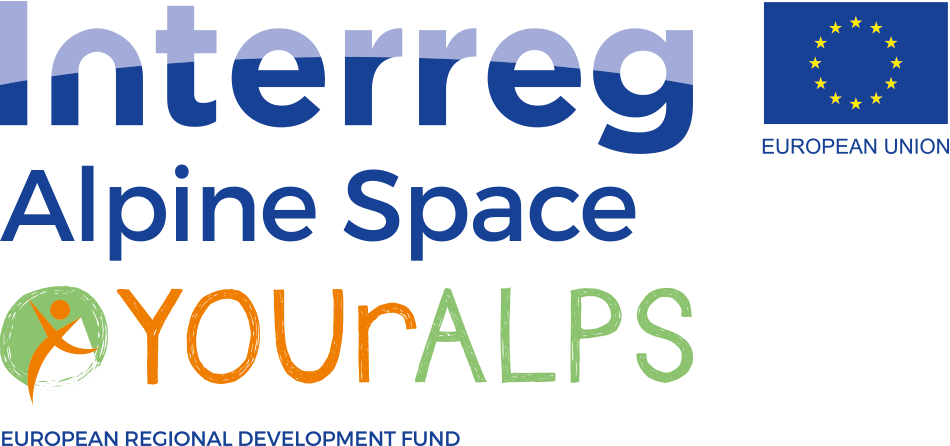The quiet off-season and welcoming Bavarian village of Balderschwang was the host of ALPARC’s latest Council meeting on April 12th and 13th 2019.
The official launch of ALPARC’s new regional platform, ALPARC CENTR’ALPS, was the main topic of the first session of the meeting. The new platform’s aim is to be closer to the protected areas located in the central Alps, to develop new and innovative projects and exchanges and to increase the involvement of new members.
The second session of the meeting was dedicated to the discussions on ALPARC’s overall programme and how to enhance new projects, especially in regards to which strategic positions should be taken on several international guiding topics (as Climate Change, etc). The schedule was thus divided into a general roundtable discussion on ALPARC’s strategy. Two thematic workshops were organized : one focusing on the elaboration of the 2020-2022 ALPARC programme, and the other on a common event to celebrate the ALPARC’s 25th anniversary project within the framework of 2020 IUCN Conference in Marseille.
The next ALPARC council meeting will be held on September 12th and 13th, 2019, in Zernez, Switzerland.
More than one hundred people interested in education for sustainable development participated in the international conference “Learning and Networking for sustainable development in the Alps” from May 14th to 15th. The conference marked the beginning of a new form of education as the Alpine School Model and the international network on mountain-oriented education ‘OurAlps’ were presented for the first time.
The Alpine School Model as a Tool to Empower Young People
‘Educate youth in the sense of mountain-oriented education for a sustainable future in the Alps’ - this is the motto of the approach promoted by the Alpine School Model which is based on the basic principles of educating on sustainable development. Moreover, the innovative approach includes outdoor learning, interdisciplinarity methods and aims at integrating non-formal approaches into formal education in order to re-connect youth to their mountain territory.
After a presentation of the approach by several pilot sites, the future of the Model and its integration in formal education curricula was debated during a roundtable involving official representatives from Italy, Austria, France and Slovenia. For example, in Italy the so-called “Reti di scopo”, several local networks made up of schools and other institutions, may manage the certification process of Alpine schools and their partners in the future. Also, in Austria, the Alpine school model will be implemented in the Burgenland region in order to ensure further dissemination and promotion. Promising remarks were expressed by the Minister for Environment and Climate of the Lombardy Region, who hopes that the Alpine school model will support the necessary changes towards a culture of sustainable development.
OurAlps Network: Connecting Alpine Students and Educators

The second big conference input involved the presentation of OurAlps, the international network on Mountain-oriented Education in the Alps, which aims to bring together stakeholders from different domains to allow for exchanges to occur on the Alpine level. Its characteristics and future perspectives were discussed together with representatives from different international and national associations such as Alplab, Alpine Town of the Year, Umweltdachverband and the WEEC network. In this context, it also became clear that thinking outside the box and considering the inclusion of periurban areas may be highly important for an Alpine approach to mountain-oriented education.
On the second conference day, three workshops were organised allowing participants to engage in deeper discussions. While the workshop on the Alpine School Model allowed for the public to discover what the Model is about in practice, the workshop on the OurAlps network encouraged the development of future scenarios. Finally, the workshop on Climate Change and Biodiversity gave the participants a possibility to dive into thematical discussions.
For more information on the project YOUrALPS and its outputs:
https://www.alpine-space.eu/projects/youralps/en/home
OurAlps network: https://www.ouralps.org/en
Facebook: YOUrALPS
Twitter: @YOUrALPS
French Presidency of the Alpine Convention
The XV Alpine Conference in Innsbruck, Austria marked the end of the Austrian presidency of the Alpine Convention. During its 2-and-a-half-year leadership, the Austrian presidency focused onclimate change under the theme “protection and utilization” of the Alps. The conference, which took place during the first week of April, highlighted some achievements made over the past few years and the hopes for the future. The presidency was then passed on to France, who will make a thematic shift to air quality, biodiversity and water issues. The following actions will be put in place to address these topics: an ad hoc group alpine convention 2on air quality has been established on June 4-5 in Paris. Concerning water issues, the French presidency will collaborate with the Annecy agglomeration (FR) since the city has expressed its commitment and it will be the site of a conference on this topic in October 2019. Moreover, going off of the June 2018 national biodiversity plan, France will continue to address biodiversity in the Alpine region in addition to hosting the IUCN World Congress on Nature Conservation in June 2020 in Marseille.
New Secretary General Appointed
The 6-year mandate of the current Secretary General Markus Reiterer has come to an end. Alenka Smerkol of Slovenia, who has experience in international business and financial management and has served as the minister responsible for development, strategic projects and cohesion for the Slovenian government will be taking over in July 2019. ALPARC wish to thank Secretary General Markus Reiter for the intensive and fruitful cooperation and support during these years and wishes the new Secretary General a fruitful and intense cooperation with the Alpine Network of Protected Areas.
Declaration of Innsbruck “Climate-neutral and Climate-resilient Alps 2050”
This declaration reconfirms the Contracting Parties’ commitment to climate change mitigation and adaptation. It highlights the conventions’ role to raise awareness about specific themes relating to climate change. The report was created by the Alpine Climate Board and it lays out specific target actions around 12 sectors to achieve climate neutrality. The declaration also includes the 7th Report on the State of the Alps which focuses on natural hazard risk governance.
The Alpine Region Commits to Soil Protection and Sustainable Land Use
Commitments on many levels have already been made to protect the soil (e.g. European Soil Charter). However, a commitment was not made by the Alpine region until this year during the XV Alpine Conference when the 2018 EUSALP Action Group 6’s declaration on land use and soil protection was recognized. This showed the Alpine region’s commitment to protect this key natural resource.
Results of the Thematic working Bodies of the Alpine convention

From 2016-2019, Thematic Working Bodies have been working to fulfill their mandates approved during the XIV Alpine Convention. Numerous publications were released under these working groups, in areas such as Natural hazards, Water management in the Alps, Sustainable Tourism, and Mountain Forests. These working bodies are the 'thematic core' of the Alpine convention, producing knowledge and information that guide decision making processes within the Convention. The XV Alpine Conference highlighted much of the work done by the Thematic Working Bodies over the past few years.
Talking with Youth
Representatives invited the delegates of the Youth Parliament to the take part in the conference. For the first time, students from the parliament actively participated in the conference table, expressing the need for urgent action on climate change in order to protect the environment for future generations.
AlpWeek Intermezzo
What will the Alps look like tomorrow? What do we want them to look like? These questions were the central theme of the AlpWeek Intermezzo, which took place simultaneously as the XV Alpine Conference. During the first day of the event, guest speakers presented three issues concerning the future of the Alpine region: 1. sustainable protection measures through mapping and limiting land use; 2. the consequences and reactions to climate change; and 3. new forms of transportation to help Alpine populations without further expanding road networks. On the second day of the conference, the past and present situation of the Alps were presented as well as a variety of projects aiming for a better future in the Alps.
For more info see: http://www.alpconv.org/en/newsevents/latest/NewsDetails.html?entryid=131923
On May 6th, 2019, the Intergovernmental Science Policy Platform on Biodiversity and Ecosystem Services (IPBES) published its report on the state of the world’s biodiversity. 145 scientists from 50 different countries and over 300 experts, carried out research for a period of 3 years. The report, 1,800 pages long, is the most exhaustive publication on biodiversity, citing over 15,000 scientific articles and references. The IPBES, whose mission is to examine the state of nature, its ecosystems and its benefits for humans, published a summary of its 2019 biodiversity rapport specifically aimed at policymakers. This summary was adopted by the 132 member states of the IPBES on May 4th.
If there’s one thing to remember from the IPBES report, it’s this - Over 1 million species are threatened by extinction due to human-induced climate change.
Biodiversity loss is accelerating at a rate never seen before. According to the report, we are at risk of losing 40 percent of amphibians, 33 percent of coral reefs, 10 percent of insects, and 25 percent of land vertebrates and fresh and saltwater marine life. The same goes for over a quarter of mammals.
What are the principle causes?
Biodiversity loss is directly linked to human activity. One of the major contributors is the agricultural industry which has transformed more than one third of land and 75 percent of fresh water sources for the consumption of animals. Other activities that have a direct impact on biodiversity include modifying land and water habitats, exploiting natural resources (often through illegal fishing and hunting), industrial pollution (e.g. plastic, pesticides) and the increase in urban areas.
The IPBES report reminds us that we benefit from ecosystems services and if we continue as ‘business-as-usual’, this loss in biodiversity will have serious consequences for the environment and humans around the world. Furthermore, those who depend the most on the environment, such as indigenous populations, will suffer the most.
However, it’s not too late to act. If we want to halt biodiversity loss, action must be taken immediately on all levels – local, national, and international, in order to save the planet.
Click here to find out more about the major findings of the report.
The eighth consecutive edition of the Fiera della Sosteniblità will take place under the sign of « Alps and Sustainability », with events and initiatives spread all over the Valle Camonica (IT) during the month of June. This year’s theme is « A passo lento », and is coordinated by Parco dell'Adamello - Comunità Montana di Valle Camonica with the protected areas of the Network Natura di Valle Camonica, and by the Cultural District of Valle Camonica and Sapori di Valle Camonica.
For a more detailed program please visit http://fierasostenibilita.parcoadamello.it/pages/home.asp
ALPARC's main goal is to promote and support the exchange of experiences and know-how between managers of the Alpine Protected Areas on a variety of shared topics.

The opportunity to exchange experiences and know-how with the managers of protected areas about all shared topics and working themes.

You can be involved in projects financed by the European Union or other financers and engage in a joint effort for the good of all the protected areas.

To develop shared projects with other protected areas; projects that one park would not be able to carry out alone.

Access to a concrete infrastructure with associated departments: mediation, data, development of management tools, logistic and linguistic assistance.

Take part in the conferences and workshops organized by ALPARC throughout the Alps with no registration fee.

Raise the profile of your own activities and innovative experiences with regard to the management of protected areas in the different fields of nature protection. ALPARC enjoys promoting the activities of its members through different channels: newsletter, press releases, social networks, etc.
among the managers of the protected areas
ALPARC, the Alpine Network of Protected Areas, was founded in 1995 to support the implementation of the Alpine Convention, in particular the Protocol on "Nature protection and landscape conservation.” ALPARC's activities cover a large geographical area, ranging from the French to the Slovenian Alps.
The association’s main goal is to promote the exchange of expertise, techniques and methods among the managers of all the large protected areas in the Alps such as national parks, regional nature parks, nature reserves, biosphere reserves, tranquility zones, UNESCO World Heritage Sites, geological reserves and sites granted a special protection status. This exchange allows for parks to take part in and carry out projects that they may not have been able to do on their own. Through international cooperation, ALPARC serves as an intermediary between institutions, local actors and Alpine communities within the region in implementing the Alpine Convention.
ALPARC carries out its actions under three main topics: Biodiversity and Ecological Connectivity, Regional Development and Quality of Life, and Education for Sustainable Development in the Alps. These three topics allow for ALPARC to take a regional approach to global issues such as climate change, nature conservation and sustainable development. Moreover, ALPARC aims to raise awareness among the general public and in particular, Alpine youth on environmental challenges.
ALPARC achieves its objectives by:
“Our Natural Treasures”: in 2019, the European Days of Parks is a call to reconnect with nature, to highlight the natural treasures that make our Protected Areas so special.
Europarc invites all European Protected Areas to organise events in and around the 24th May to jointly celebrate our natural treasures. There are promotional materials available in 30 languages. Events should be register here.
All information and promotional material available at: www.europarc.org/european-day-of-parks
Climate Change is threatening our planet. According to the Intergovernmental Panel on Climate Change’s ‘Special Report’, if global temperatures rise above 1.5 °C (above pre-industrial levels) we will face extreme climate events, a substantial increase in biodiversity loss, and difficulties gathering fresh water.
Climate Change in the Alps
The situation in the Alpine region is even more alarming, with rising temperatures about “twice as large as the global trend” (Brunetti et al., 2009). Furthermore, climate change’s effects are three time stronger in the Alps than the world’s average (OECD, 2007) and gathering fresh water is becoming an increasingly urgent issue. Over 90 percent of glacier volume in the Alps could be lost by 2100. Ice melting has become a symbol of climate change in the Alps, since it is the most visible and easily measured effect of climate change and due to the glaciers’ high importance for the region’s landscapes, ecosystems and economy. ‘The Cryosphere’ review envisages two alarming scenarios in which, depending on the increase in global temperatures, Alpine glaciers may or may not survive.
Alpine States are committed to climate change action and have adopted the Alpine Convention’s ‘Declaration on Climate Change’ (2006) and ‘Action Plan on Climate Change in the Alps’ (2009). Since 2011, “taking action on climate change” has been one of the priorities set during the ‘Multi-Annual Work Programme of the Alpine Conference’. This brought about the establishment of the Alpine Climate Board in 2016, which coordinates all climate change-related activities.
Concrete actions in Alpine Protected Areas
Several Alpine protected areas are carrying out concrete actions to deal with the effects of climate change which mainly consist in monitoring and research, adaptation and mitigation measures, promotion, educational activities and dissemination of relevant information to the general public.
In France, the project Alpages sentinelles, started in 2000, studies and measures the effects of climate change on 31 Alpine pastures. The project’s goal is to develop adaptation measures to preserve the traditional pastoral activity in the Alps. It involves the Ecrins National Park, Vanoise National Park, Mercantour National Park, Chartreuse Nature Regional Park, Vercors Nature Regional Park, and Luberon Nature Regional Park. The partners of Alpage sentinelles met last March to analyse the results of 2018 - the warmest year ever recorded since the launch of the project. They agreed that the most effective measure is to manage the Alpine pastures in a way that avoids further stress on the grasslands. Indeed, pastures are already feeling the effects of increasing temperatures, resulting in the depletion of vegetation.

In the same direction, the National Park of Ecrins and the National Park Gran Paradiso launched the LIFE project PastorAlp. Based on a consistent activity of transboundary research, the final output of the project consists of developing a platform of tools to facilitate the adoption of climate change adaptation strategies in the two parks.
The Interreg Alcotra CClimaTT project involves transborder protected areas from France and Italy. The objectives of the project include: gathering more knowledge and understanding of climate change effects; involving and informing the general public; and influencing people’s behaviour toward greater environmental responsibility. Within this framework, the Ente Aree Protette Alpi Marittime and National Park of Ecrins, offered 40,000 euros to eight projects, selected by a jury of experts, that promote a resilient and climate-smart future under the motto “If climate changes… we change as well!”. The winners will implement activities for the mitigation and adaptation to climate change in Alpine areas.
The Festival scientifique “Avec ou sans Glace” is an example of a series of activities held to inform the general public on the effect of climate change in the Alps with specific reference to glaciers melting. The conference organised by the National Park of Vanoise (France) included a ‘geological hike’ to discover the impact of the melting glaciers and a conference where climate change experts interacted with the public.
Apart from informing the general public, protected areas play a key role in carrying out educational activities on climate change effects. For example, the Natural Park of Adamello (Italy), together with a local high school, organised outdoor activities dedicated to pupils under the Interreg project YOUrALPS: The trees in the Alps as a signal of climate change. Students were guided by experts to discover the effects of climate change on forests to better understand the changing ecosystem. In Austria, still under the YOUrALPS project, educational activities were carried out in the Nature Park Geschriebenstein where high school students were confronted with the issue of extreme weather events caused by climate change. During on-field activities, they experimented with climate change adaptation and mitigation measures against floods.
In Slovenia, the Triglav National Park is part of the Julian Alps Biosphere Reserve. This initiative is an intergovernmental research programme that establishes a global network of biosphere reserves. This network strives to uphold the balance between people and nature, biodiversity and sustainable development and upkeep of cultural values. This is a great example of the enhancement of an active ‘sink’ of GHGs, which is a strong mitigation measure against climate change.
Moreover, the Berchtesgaden National Park, in Bavaria, is involved in different climate monitoring activities. One of these activities is the Klimamessnetz (Climate monitoring network). It relies on the National park service and the German weather service to track the changes in Alpine climate in the long run and in a large area. Moreover, the National Park is one of GLORIA-EUROPE research sites whose goal is to understand future scenarios we will have to face due to climate change.
Climate Change is producing severe effects on the Alps, but protected areas are fighting to resist.
Protected Areas' Actions:
Festival scientifique “Avec ou sans Glace”
Triglav National Park, the Julian Alps Biosphere Reserve
If the climate changes… We change as well!
The Trees in the Alps as a sign of Climate Change
“Draußen unterrichten“– Biodiversity Strategies
Global Observation Research Initiative in Alpine Environments
Bibliography
Brunetti et al., 2009, ‘Climate variability and change in the Greater Alpine Region over the last two centuries based on multi-variable analysis’, in International Journal of Climatology
Intergovernmental Panel on Climate Change, 2018, ‘Special Report: Global Warming of 1.5 ºC’, as seen in https://www.ipcc.ch/sr15/, 25-04-2019
NASA, 2019, ‘Responding to Climate Change’ as seen in https://climate.nasa.gov/solutions/adaptation-mitigation/, 26-04-2019
Organisation for Economic Co-operation and Development, 2007, ‘Climate Change in the European Alps: Adapting Winter Tourism and Natural Hazards Management’, ed. Shardul Agrawala
Zekollari et al., 2019, ‘Modelling the future evolution of glaciers in the European Alps under the EURO-CORDEX RCM ensemble’, in The Cryosphere, volume 13, pp. 1125-1146
Is it possible to make the Alps climate-neutral and resilient by 2050?
The Permanent Secretary of the Alpine Convention lays out concrete actions for the Alpine region to turn this objective reality in its new publication "Climate-Neutral and Climate-Resilient Alps 2050". The publication highlights three central policies, coming from the 25th Alpine Convention: The Declaration of Innsbruck, the Alpine Climate Target System 2050 and the 7th Report on the State of the Alps “Natural Hazard Risk Governance”. The Alpine Climate Target System 2050, prepared by the Alpine Climate Board over the last two years, describes specific actions that must be taken under 12 different sectors to protect the Alps from climate change. The 7th Report on the State of the Alps describes the future for natural hazard risk governance.
The Alpine Convention’s new publication calls for the Contracting Parties to prioritize climate change action and policies to preserve the Alps’ natural heritage. These targets showcase the Alps as being a model for international cooperation and its role in climate change adaptation and mitigation.
The publication “Climate-Neutral and Climate-resilient Alps 2050" is available here.
Come to the international conference "Learning and networking for sustainable development in the Alps - The Alpine School & OurAlps network" on May 14th and 15th 2019 in Morbegno.
The Alpine School Model, one of the major YOUrALPS project output aiming at re-connecting youth to their natural environment, will be presented at the conference.
The event will give you the opportunity to discover the OurAlps network and to network with other Alpine stakeholders.
The event is organised in the frame of the INTERREG Alpine Space YOUrALPS project.
To register to the conference and for further information please click here:
